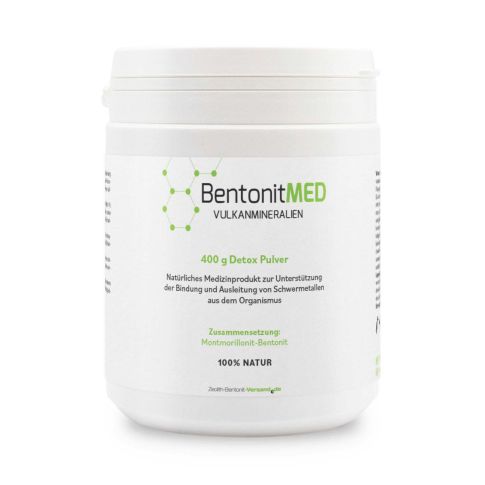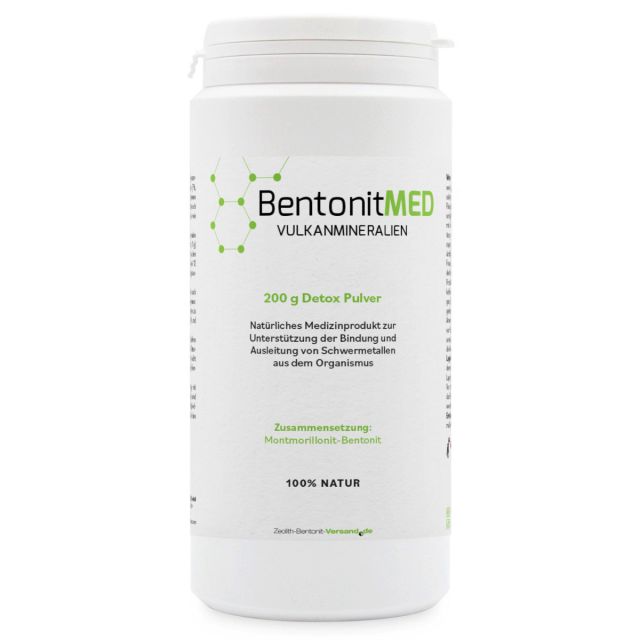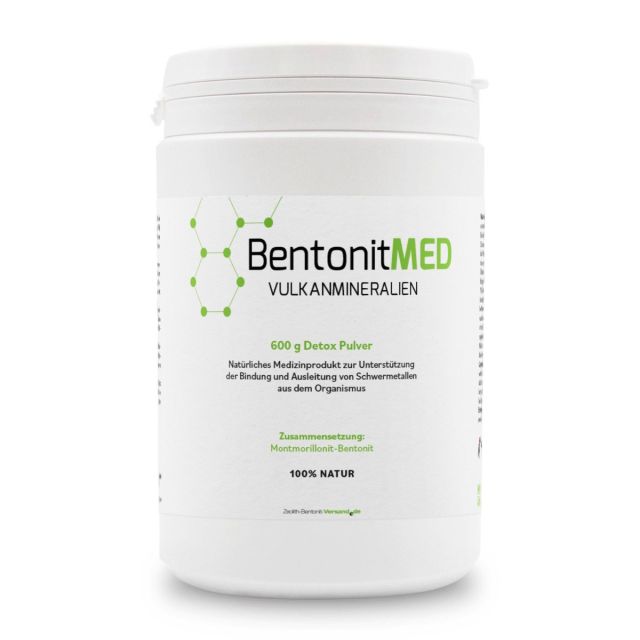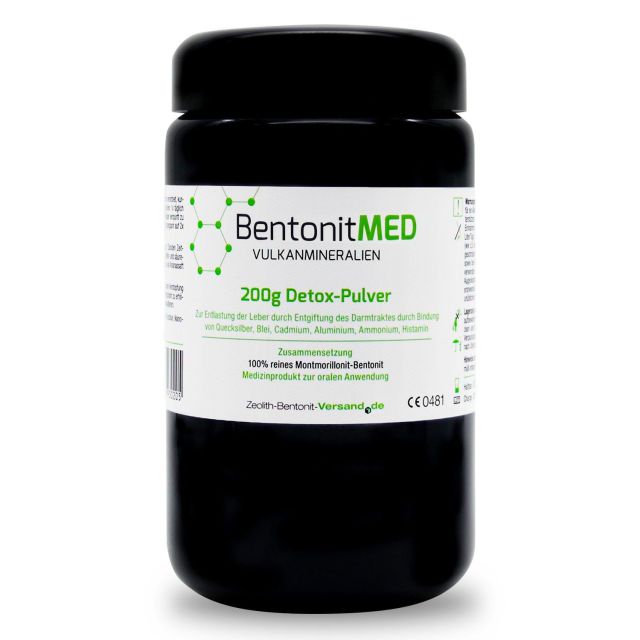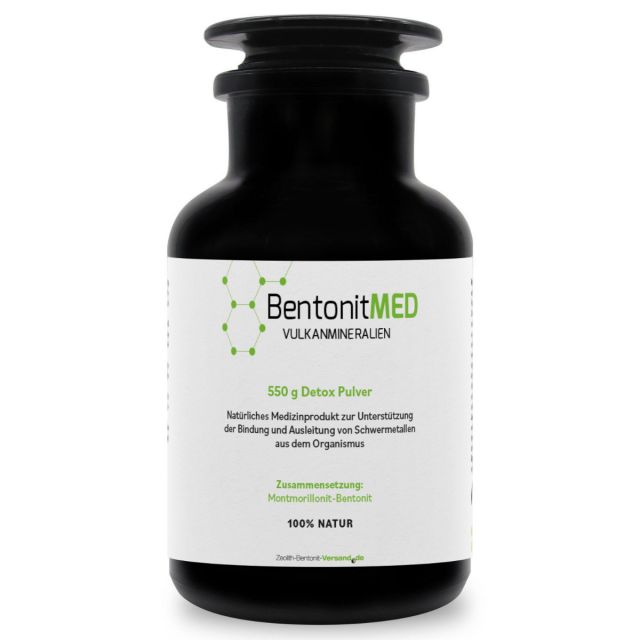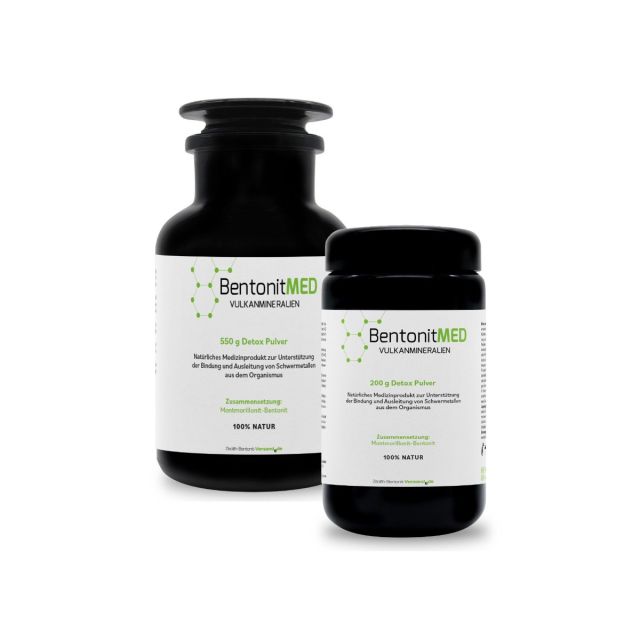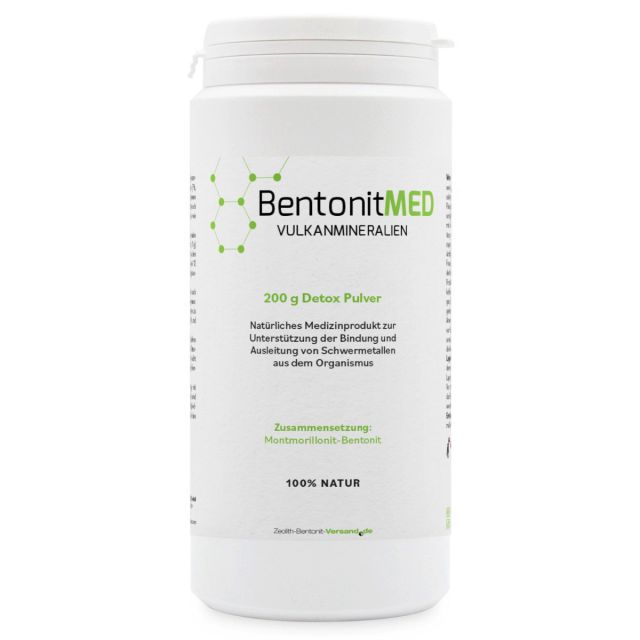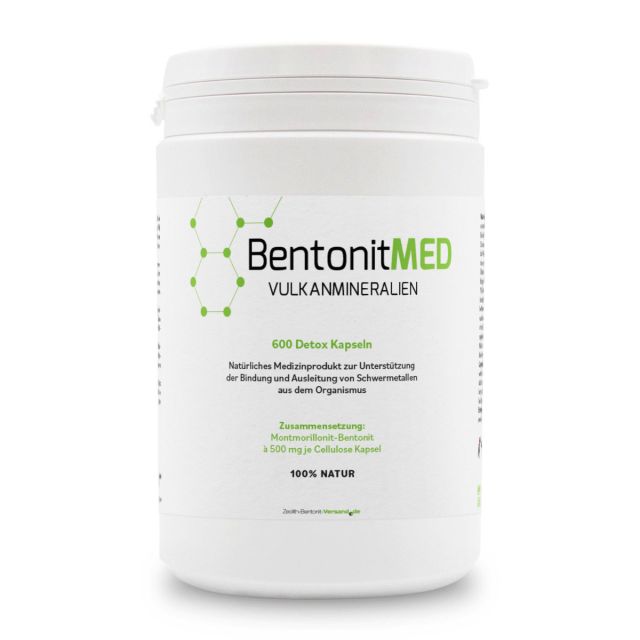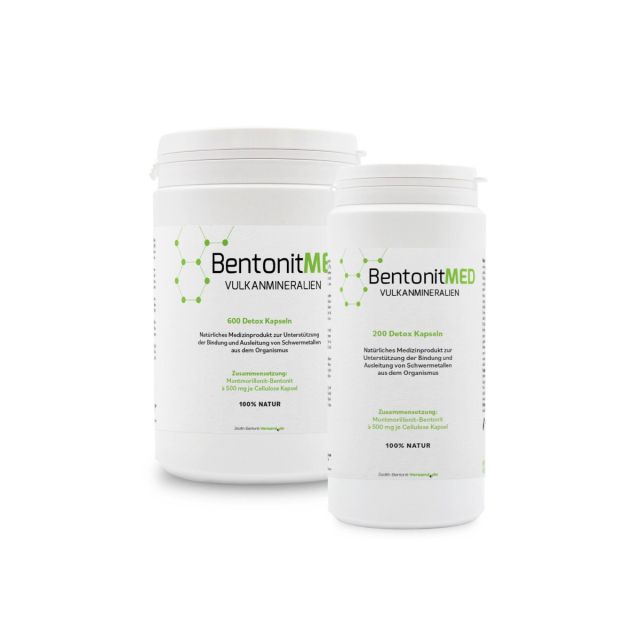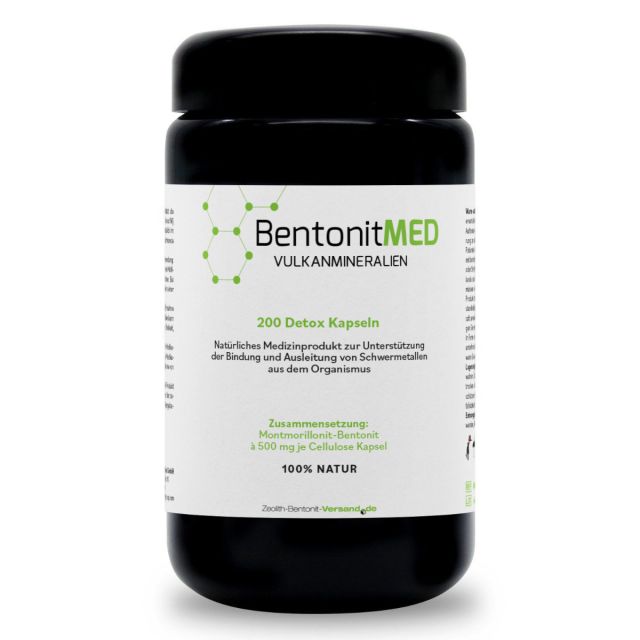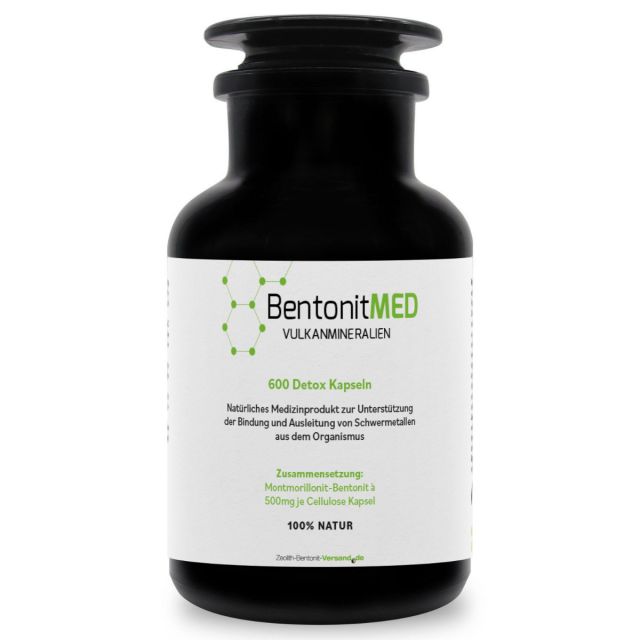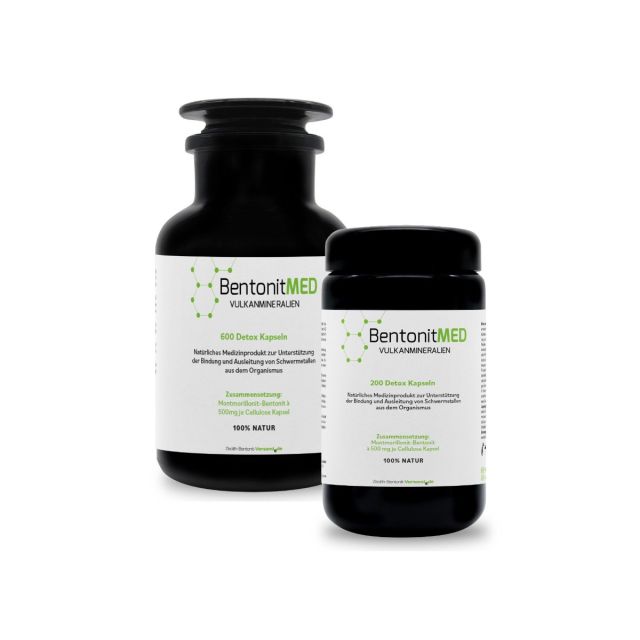Be the first to review this product
Bentonite
BentonitMED detox powder 400g, medical device with CE certificate
100% natural montmorillonite bentonite powder in a sealed powder jar
- save 1% buy 2 for €20.61 each
- save 4% buy 4 for €19.98 each
- save 8% buy 6 for €19.25 each
Ratings & Reviews
Natural bentonite as a CE-certified medical device
Author: Zeolith Bentonit Versand, updated: 03.11.2023
BentonitMED is an independently tested, pharmacy-grade product with CE certification for long-term, internal use in humans. It is used for detoxification by effectively binding harmful substances in the body and relieving certain symptoms. The montmorillonite content in bentoniteMED is more than 95%. Our bentonite is available in both powder and capsule form. It meets all the requirements of the European Pharmacopoeia and thus corresponds to "pharmacy quality". Similar to zeolite, bentonite is a volcanic mineral formed by weathering volcanic ash. The layer-like structure and advantageous micronization give the mineral its special properties. In particular, bentonite is suitable for binding pollutants such as lead, mercury, cadmium and aluminium through selective ion exchange and adsorption and gently removing them from the body via the intestines. Bentonite forms a protective gel film in the gastrointestinal tract of humans, making the natural mineral ideal for people who have a sensitive stomach or intestines.
Montmorillonite is a very soft phyllosilicate from the group of minerals that are precipitated as microscopic crystals from an aqueous solution and are called clay. It is named after Montmorillon in France. Montmorillonite, a member of the smectite group, is a 2:1 tone. The particles are platelet-shaped with an average diameter of about 16 microns. In order to "see" individual clay particles, about 25,000x magnification with an electron microscope is required. The group of bentonites also includes: saponite, nontronite, bedelllite and hectorite. Montmorillonite-bentonite is the bentonite relevant to human health.
Montmorillonite bentonite has a remarkable swelling ability. It can absorb six to seven times its dry matter in liquid. This swelling ability has positive effects on the intestinal health of humans, which can be helpful, for example, in cases of diarrhoea.
Answers to frequently asked questions about detoxification with zeolite, bentonite and ZeoBent can be found in our FAQs.
Order bentonite as powder or capsules?
 PDF Product Informationen
PDF Product Informationen
 PDF Instructions for use Bentonite MED
PDF Instructions for use Bentonite MED
Montmorillonite-Bentonite Detoxification
Author: Zeolite Bentonite shipping, updated: 19.10.2018
You are on the safe side, because here you receive Montmorillonite Bentonite for ingestion as Bentonite MED Detox powder or Bentonite MED Detox capsules in effectively and safely CE-certified tested quality as medical devices for internal use directly from us as the manufacturer. If you have any questions, please do not hesitate to contact us by e-mail. Information on our payment methods can be found here. Orders received before 14.30 hrs will be shipped the same day.
Bentonite is a clay mineral that was formed by weathering volcanic ash and is also used to bind harmful substances. In Europe one finds important deposits e.g. on the Greek island Milos, in Turkey and in Germany. Our bentonite for detoxification is tested and processed in Germany. Its largest component is montmorillonite, named after the French community of Montmorillon, an important quality criterion for bentonite detoxification. Normally, the content of montmorillonite is between 60 and 80 percent. In our bentonite MED, the content of montmorillonite bentonite is as high as 95 percent.
Bentonite differs from zeolite, which is also used for detoxification, in its montmorillonite gel film, which is why it is considered a "gentle" detoxifier. The natural montmorillonite gel film has a protective effect on the mucous membrane of the gastrointestinal tract. Bentonite MED is therefore particularly suitable for detoxification of users with sensitive gastrointestinal mucosa. The high ion exchange capacity of montmorillonite ensures that harmful substances such as aluminium, lead, mercury and cadmium, radionuclides, histamine and ammonium can be bound. Bentonite MED is available for internal use as powder and in capsules, filled in plasticizer-free containers or MIRON-Glass. Please follow the instructions for use stated in the instruction manual.
You will find answers to frequently asked questions about detoxification with Zeolite, Bentonite and ZeoBent in our FAQs.
Bentonite as powder or capsules?
 PDF Product Informationen
PDF Product Informationen
 PDF Instructions for use Bentonite MED
PDF Instructions for use Bentonite MED
Bentonite Montmorillonite – a look at the volcanic mineral
Bentonite is a volcanic material that was deposited millions of years ago in broad layers that weathered and changed from a fragile glassy state to a mineral one. The net negative charge of bentonite attracts positively charged proteins. The immense internal surface area between the individual alumina-silica plates provides an abundance of attachment sites (Gougeon et al., 2002). The charged sites on the proteins are neutralized by cation exchange, which leads to flocculation and deposition as a clay-protein complex. Bentonite clay is part of the "smectite" group of clay, which is known for its ability to expand when exposed to a liquid. It is rich in minerals, including silica, magnesium, calcium, sodium, copper, iron, and potassium. There are two types of bentonite clay, depending on the ratio of the main minerals they contain: sodium-bentonite clay and calcium-bentonite clay. They have similar characteristics, with subtle nuances. Calcium bentonite clay, is also the type that is typically preferred for consumption when used for detoxification purposes, as it is gentler on the stomach.
Bentonites of different types are found in different geographical locations around the world, they are mined from different depths and are obtained in different degrees of purity, particle sizes, adsorption capacities and swelling capabilities (Marchal et al., 1995). Geophagy (the ingestion of soils, minerals, and rocks by humans) has been observed as an adaptive behavior in humans and animals [1]. Clays and earths have been considered healing materials since ancient times. Since geophagia is an occasional habit of animals and humans, it is physiologically thought that soil could have some positive effects on body function.
Bentonite is an absorbent aluminum silicate. It is named after Fort Benton, Wyoming, where its largest deposits are found. Its other name, montmorillonite clay, derives from the Montmorillon region of France, where it was first found. It has been used and eaten from ancient times to the present day. When mixed with water, it creates a paste that can be used both externally and internally. In some areas, such as Iran, it has been used as a hair wash since time immemorial. There is sufficient literature to prove its safety after chronic oral intake [2-6].
The basis for many of bentonite's presumed benefits is that it is highly adsorptive, which makes it attract positively charged particles such as a magnet, both when applied topically and when taken internally. The particles of the clay carry a negative electrical charge. Heavy metals and carry a positive charge and some research suggests that negatively charged bentonite is able to attach to these substances and help remove them from the body.
One of the best-studied properties of bentonite is its ability to bind and excrete pollutants such as heavy metals. Bentonite has a detoxifying effect due to its poly-cationic nature, because it is able to bind negatively charged toxins in the gastrointestinal tract through adsorption and transport them out of the body.
Various studies suggest that bentonite can reduce the effects of toxins. [1] For example, a study on chicks [2] found that montmorillonite bentonite reduced the effects of a toxin. Chicks that received a concentrated bentonite clay product had less toxic effects than those that did not receive the clay. Another study [3] evaluated the effects of montmorillonite, a type of bentonite, on reducing toxins in children in Ghana, West Africa. The researchers found that children who were given a product made from calcium montmorillonite clay daily for two weeks had fewer signs of the toxin in their urine than children who did not receive this product.
In a small-scale animal study, rats consumed wastewater that contained a pollutant. The researchers gave a portion of the rats different amounts of bentonite clay or a placebo. Those who received the most clay had the least amount of the poison in their bodies after 3 weeks.
Metal toxicity, or metal poisoning, is the toxic effect of certain metals in certain forms and doses on life. Lead poisoning is a medical condition in humans and other vertebrates caused by increased concentrations of the heavy metal lead in the body. Lead interferes with a variety of bodily processes and is toxic to many organs and tissues, including the heart, bones, intestines, kidneys, and reproductive and nervous systems. In the subjects of one study, administration of montmorillonite for 100 days resulted in a reduction in lead concentrations in the blood, brain, liver, bones, kidneys, and hair [23]. Copper toxicity, also called copper poisoning, refers to the consequences of an excess of copper in the body. In the subjects of one study, it was found that dietary Cu bioavailability can be reduced by oral supplements of bentonite [24]. Cadmium is an extremely toxic metal that is commonly found in industrial workplaces. Exposure of carp (Carassius auratus) to dietary cadmium caused oxidative stress, while dietary montmorillonite relatively reversed cadmium-induced oxidative damage in the liver and kidney [25]. In addition, bentonite is reported to reduce cadmium-induced cytotoxicity and genotoxicity in Nile tilapia fish [26]. In general, it seems that bentonite is a reliable treatment for metal poisoning.
Bentonite effect when used externally
Bentonite has been used externally on the skin for a long time. Nettles and other plants are the most common causes of allergic contact dermatitis in Europe. Bentonite has been shown to be effective in preventing or reducing experimentally induced allergic contact dermatitis [28]. Irritant and allergic hand dermatitis is considered a difficult problem to control in individuals who are unable to avoid causative exposures. The use of bentonite in a moisturizing cream has been shown to improve chronic hand dermatitis in a majority of individuals with previously uncontrolled dermatitis [30]. For diaper rash, which is one of the most common skin conditions in childhood, bentonite reportedly works better and faster than alternatives. [32]. Before undergoing external medical treatment, it is advisable to consult your trusted doctor.
Bentonite may act as a barrier to the transfer of toxic organophosphorus compounds through the skin, suggesting its physical protective effect on the skin [33]. In the case of sunscreens, inclusion complexes of commercial sunscreens in montmorillonites have been reported to exhibit optimized functional properties such as water resistance and skin adhesion, making them a good substrate in these types of skin products [34]. In addition, sunscreens containing a certain amount of bentonite mineral are reported to be more effective at absorbing the highest percentage of UV light than commercially available sunscreens [35].
Although it has long been used as a hair cleanser and emollient in many areas, such as Iran, there is no scientific article that evaluates its effect on hair. However, bentonite has now been shown to increase wool growth in sheep [37].
Bentonite effect in the gastrointestinal tract
For a long time, bentonite was considered a cure for diarrhea. In 1961, orally administered bentonite was shown to treat a significant proportion of all cases with various causative factors of diarrhea (viral infection, food allergy, spastic colitis, mucous colitis, and food poisoning) [38].
Irritable bowel syndrome (IBS) is a common, chronic disease of the digestive system. It can cause bouts of abdominal cramps, bloating, diarrhea, and/or constipation. When bentonite (3 g, t.d. for 8 weeks) was administered to patients with irritable bowel syndrome (IBS), it affected this syndrome. Although pain or discomfort was not significantly improved in the overall IBS population treated with montmorillonite compared to placebo, it modulated habits in constipation-dominated IBS [39]. Montmorillonite, which was combined with zinc in the diet, improved growth, relieved diarrhea after weaning, and improved the integrity of the intestinal mucosa and the activities of digestive enzymes in the pancreas and small intestine contents of pigs [40].
While bentonite can absorb many organic and inorganic materials in the gastrointestinal tract, it is reported not to negatively affect mineral metabolism [10] and micronutrient absorption [41]. The intestinal flora is the complex community of microorganisms that live in the digestive tract of humans and other animals. These microorganisms benefit the host by fermenting fiber into short-chain fatty acids and synthesizing vitamin B and vitamin K, as well as metabolizing bile acids, sterols, and xenobiotics [42]. Intragastric administration of bentonite to rats for 28 days results in hyperproduction of colonic yeast microflora [43]. Then bentonite could support the absorption of nutrients by increasing the activity of the intestinal flora.
Source references
1st https://link.springer.com/article/10.1007/s10653-016-9903-4
2nd https://academic.oup.com/ps/article/96/6/1651/2498817
3. https://www.ncbi.nlm.nih.gov/pmc/articles/PMC4183404/
4. https://www.ncbi.nlm.nih.gov/pubmed/21800636/
5. https://www.ncbi.nlm.nih.gov/pubmed/12851164
6. https://www.ncbi.nlm.nih.gov/pubmed/25135766
7. https://www.ncbi.nlm.nih.gov/pubmed/20607126
8. https://www.ncbi.nlm.nih.gov/pubmed/6674289
9. https://www.ncbi.nlm.nih.gov/pubmed/2547262
10. https://www.ncbi.nlm.nih.gov/pubmed/8099347
11th https://www.ncbi.nlm.nih.gov/pubmed/23605531
12th https://www.ncbi.nlm.nih.gov/pubmed/25990012
13. https://www.ncbi.nlm.nih.gov/pubmed/26343723
14. https://www.ncbi.nlm.nih.gov/pubmed/24423730
15. https://www.ncbi.nlm.nih.gov/pubmed/22069725
16. https://www.ncbi.nlm.nih.gov/pubmed/22324939
17. https://www.ncbi.nlm.nih.gov/pubmed/23697800
18. https://www.ncbi.nlm.nih.gov/pubmed/16159179
19. https://www.ncbi.nlm.nih.gov/pubmed/19268453
20. https://www.ncbi.nlm.nih.gov/pubmed/360833
21. https://www.ncbi.nlm.nih.gov/pubmed/7070010
22. https://www.ncbi.nlm.nih.gov/pubmed/2069544
23. https://www.ncbi.nlm.nih.gov/pubmed/18568297
24. https://www.ncbi.nlm.nih.gov/pubmed/1541731
25. https://www.ncbi.nlm.nih.gov/pubmed/20532670
26. https://www.ncbi.nlm.nih.gov/pubmed/26001163
27. https://www.ncbi.nlm.nih.gov/pubmed/9222844
28. https://www.ncbi.nlm.nih.gov/pubmed/7622647
29. https://www.ncbi.nlm.nih.gov/pubmed/2522756
30. https://www.ncbi.nlm.nih.gov/pubmed/11685665
31. https://www.ncbi.nlm.nih.gov/pubmed/25097603
32. https://www.ncbi.nlm.nih.gov/pmc/articles/PMC4774071/
33. https://www.ncbi.nlm.nih.gov/pubmed/23518320
34. https://www.ncbi.nlm.nih.gov/pubmed/18473236
35. https://www.ncbi.nlm.nih.gov/pubmed/25505763
36. https://www.ncbi.nlm.nih.gov/pubmed/24507371
37. https://www.ncbi.nlm.nih.gov/pubmed/1429295
38. https://www.ncbi.nlm.nih.gov/pubmed/13719543
39. https://www.ncbi.nlm.nih.gov/pubmed/15709995
40. https://www.ncbi.nlm.nih.gov/pubmed/22539019
41. https://www.ncbi.nlm.nih.gov/pubmed/15205041
42. https://www.ncbi.nlm.nih.gov/pubmed/24892638
43. https://www.ncbi.nlm.nih.gov/pubmed/23088139

